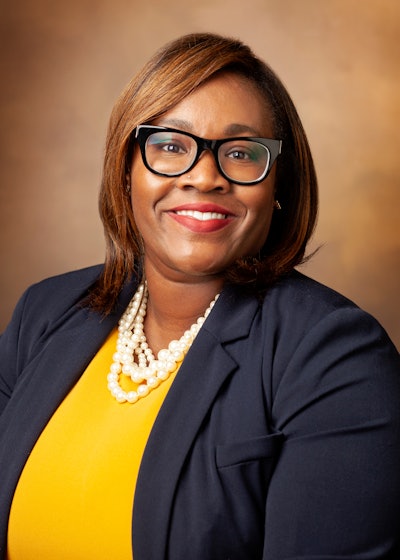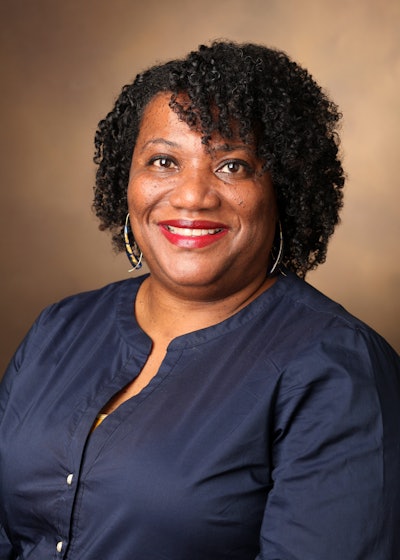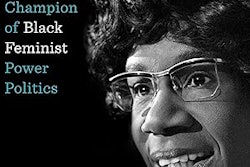In the summer of 2014, Crystal Jackson was working as a manager of nurse education in Ferguson, Missouri. Michael Brown, a Black teenager, had been fatally shot by a white police officer, and the city was on fire. Jackson hoped that her institution would respond, issue a statement about what had happened and the pain that it might bring Black and brown employees. It never did.
“It’s traumatic. I have sons,” says Jackson. “Just acknowledge that there is emotion that comes with what has happened and [offer] some resources.”
Although Jackson was in a leadership role, it was her first. She never considered raising the issue.
 Crystal Jackson
Crystal Jackson
The tension took a toll.
“It was draining,” she says. “It was exhausting. [You] start to question your personal morals and values in relation to where you work. Do you work for an organization that doesn’t support what’s important to you?”
The situation that Jackson faced is just one of the many difficulties that can confront nurses from minoritized backgrounds. Such nurses represent just 19.4% of all registered nurses, according to the National Council of State Boards of Nursing and the National Forum of State Nursing Workforce Centers. This paucity is mirrored in academia, where only 19.2% of full-time nursing school faculty are minoritized, according to the American Association of Colleges of Nursing.
In addition to overt racism and microaggressions, nurses from under-represented backgrounds can face feelings of isolation and stress that come from knowing that they may be perceived differently.
“You probably over-prepare for meetings,” says Dr. Rolanda Johnson, associate dean for equity, diversity and inclusion at the Vanderbilt University School of Nursing. “[You’re] constantly analyzing things.”
“It’s a lot of mental [acrobatics] that go on, I’ll tell you that,” says Mamie Williams, senior director for nurse diversity and inclusion at the Vanderbilt University Medical Center (VUMC).
But Johnson and Williams have created a program to help minoritized nurse leaders with just these sorts of experiences. It’s called the Academy for Diverse Emerging Nurse Leaders (ADENL), and it’s taking place for the first time Nov. 14-18 at Vanderbilt.
“The ADENL is one of very few programs in the country that is designed by diverse nurse leaders in academia and practice, for aspiring and diverse nurses and nurse leaders that are traditionally not considered for leadership roles,” says Dr. Katie Boston-Leary, director of nursing programs and co-lead for Project Firstline at the American Nurses Association. “Programs like this are needed to open opportunities for nurses from all diverse backgrounds to be seen as potential leaders and not to be seduced into assimilation to sustain those roles due to lack of opportunities for diverse groups.”
Boston-Leary will be speaking at the academy. Jackson, now the senior director of nursing education and professional development for the adult ambulatory clinics at VUMC, will be among the inaugural class of 20 fellows.
“It speaks to my soul because it’s something just for me as a diverse leader,” says Jackson. “I’m really excited about that.”
The ADENL comes along at an important time: as Baby Boomers age, the United States is facing a projected shortage of hundreds of thousands of nurses. And the benefits of nurses from varied backgrounds are clear. Research has shown that a diverse team of health care providers has been linked to improved care and to financial savings.
But the burdens that are placed on nurses from under-represented backgrounds mean that they may not choose to stay in the profession. This was clear to Williams when she spoke to the accepted fellows.
 Mamie Williams
Mamie Williams
The ADENL seeks to give diverse nurse leaders the tools that they need to flourish in their roles. Williams and Johnson hope this will help to short-circuit what has become a self-fulfilling prophecy in the nursing world: people from minoritized backgrounds are less likely to join the profession and to move up within it if they cannot see potential role models and mentors.
“We think [ADENL] will have a huge effect,” says Williams.
She and Johnson have sought to embed the personal accounts of both the fellows and the faculty into the curriculum.
“We ask for examples from their lived experiences,” Johnson notes. “Things that went well, things that did not go well.”
The result is sessions on imposter syndrome and value incongruence, or differences between a nurse’s personal philosophy and that of their institution. This is what Jackson encountered in Ferguson, and it may be more likely to arise for nurses whose backgrounds have not been traditionally represented in leadership.
The ADENL will include sessions about everything from writing financial and strategic plans to productive conflict and leadership projection. There will be lectures, case studies, small group discussions, and panels.
Speakers will include minoritized leaders from beyond the nursing field, including doctors, an athletic director, and a representative from the Hispanic Chamber of Commerce. A psychologist will present on how fellows can use their strengths to enhance their leadership styles. And national leaders who cannot appear in person will Zoom in.
There will also be conversations about social justice, highlighted by a talk from a nurse who runs a local church. According to Williams, nurses have always been involved in addressing society’s inequities.
“It's in our professional practice to begin with, to advocate for equity in health care,” says Williams. “There's a need for nurses to pick up the mantle and to engage in social action to alleviate those social determinants which affect the health of the folks that we care for.”
Another panel will discuss building community, both with the people that the fellows’ institutions serve and with colleagues and peers. These bonds, and the feelings of belonging and solidarity that they create, are crucial to minoritized nurses staying in the profession and in leadership roles. Fellows will have opportunities to network with each other and with guest speakers.
The ADENL’s reach will extend past the week-long, in-person schedule of events. Fellows will also embark on a year-long project at their home institution under the mentorship of leaders from the academy as well as a leader from their workplace.
The projects are intended to help the fellows make real changes in their institutions on issues of diversity, equity, and inclusion. Jackson hopes to study ways to draw diverse candidates into nursing professional development.
But Johnson and Williams believe that the effects of the academy can be even longer lasting.
“Our hope is that when the attendees leave, they will take the principles that they've learned and implement them within their institutions,” says Johnson. “We hope that the week will strengthen them and refresh their vision, knowing that now they have a network of support that will continue throughout their professional careers.”
Although the inaugural session is yet to begin, Johnson and Williams are already brainstorming ways that the ADENL can expand. Johnson envisions hosting it twice a year instead of annually and imagines extending it to nurses who do not yet have leadership positions.
“There is a larger cohort of diverse nurses who are not in official leadership roles and maybe don't understand those key pieces they need so they will be prepared,” Johnson explains.
For now, Jackson is eagerly anticipating the academy.
“I’m expecting to feel rejuvenated,” says Jackson. “Empowered to do good work.”


















